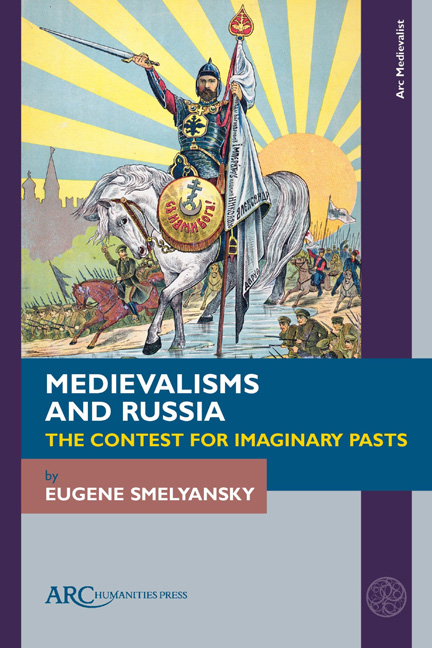Book contents
- Frontmatter
- Contents
- List of Illustrations
- Acknowledgements
- Names, Transliteration, and Abbreviations
- Introduction
- Chapter 1 A Contested Inheritance: Medieval Rus and Russia’s Origin Myths
- Chapter 2 Alexander Nevsky: The Once and Future Prince
- Chapter 3 Byzantine Dreams: Russia as the “Third Rome”
- Chapter 4 Medievalism as Allegory: The Middle Ages in Unofficial Culture
- Conclusion
- Select Bibliography
- Index
Chapter 2 - Alexander Nevsky: The Once and Future Prince
Published online by Cambridge University Press: 08 May 2024
- Frontmatter
- Contents
- List of Illustrations
- Acknowledgements
- Names, Transliteration, and Abbreviations
- Introduction
- Chapter 1 A Contested Inheritance: Medieval Rus and Russia’s Origin Myths
- Chapter 2 Alexander Nevsky: The Once and Future Prince
- Chapter 3 Byzantine Dreams: Russia as the “Third Rome”
- Chapter 4 Medievalism as Allegory: The Middle Ages in Unofficial Culture
- Conclusion
- Select Bibliography
- Index
Summary
DURING THE EARLY months of 2021, Moscow's residents were treated to a brief democratic contest: a chance to cast an online ballot for one of two candidates. The winner—a statue—would grace the infamous Lubyanka Square, the headquarters of the Soviet Union's KGB and its successor, the Federal Security Service (FSB). Prior to the Soviet Union's collapse in 1991, the square featured a statue of Felix Dzerzhinsky (1877–1926), a Bolshevik revolutionary and the founding father of the state security apparatus. Nicknamed the “Iron Felix,” Dzerzhinsky was behind the wave of political repression that followed the Bolshevik Revolution of 1917. He remained the symbol of unwavering commitment to state violence, embodied in the institution he founded. Unsurprisingly, the removal of this statue in 1991 was one of the first public acts that marked the beginning of post-Soviet Russia.
Thirty years after the protests toppled Dzerzhinsky's statue, another public campaign began to demand its return. These voices are emblematic of Russia's deepening authoritarianism and its reliance on ever-expanding security forces. Perhaps because Dzerzhinsky's reappearance on Lubyanka was too symbolic, a new, rival candidate emerged. Unlike the “Iron Felix,” his rival hailed from a deeper past: a medieval prince of Novgorod, a saint, and more-or-less a household name in Russia, Alexander Nevsky (1221–1263). Viewed as a more moderate and less odious figure, Nevsky—though, notably, a patron saint of the FSB—seemed like a compromise and was rumoured to have the Kremlin's support. Ultimately, Moscow's mayor called off the contest and left the Lubyanka Square as it was. But the question that arises from all this remains: why is a medieval prince associated with state security?
Increasingly commemorated by the state, the ROC, and various military-patriotic non-governmental organizations, Alexander Nevsky is at the heart of Russia's political medievalism. Since his death in 1263 and the composition of his saint's life some years later, the prince has become a site of memory routinely interacted with by Russia's ruling and church elites as a form of commemoration from above. As a military and political leader praised for his victories against Swedish and German invaders, Nevsky is invoked primarily as a bulwark figure, a symbol of national defence and resurgence, and a powerful symbol of Russian conservatism.
- Type
- Chapter
- Information
- Medievalisms and RussiaThe Contest for Imaginary Pasts, pp. 39 - 66Publisher: Amsterdam University PressPrint publication year: 2024



